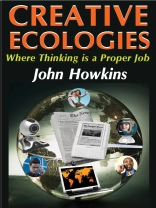The main question of our age is how we live our lives. As we struggle with this question, we face others. How do we handle ideas and knowledge, both our own and those of others? What relationship to ideas do we want? Whose ideas do we want to be surrounded by? Where do we want to think? Most choose, or have the choice made for them, according to what family, colleagues, and friends do and say and what we read about, and a more or less rational calculation of the odds.
Modern ecology results from the shift in thinking generated by quantum physics and systems theory, from the old view based on reductionism, mechanics, and fixed quantities to a new view based on holistic systems where qualities are contingent on the observer and on each other. This perception changes how people treat ideas and facts, certainties and uncertainties, and affects both art and science. Worldwide it is part of the process of understanding the current crisis in the environment, and the balance of economy, creativity, and control required in our response.
The book’s starting point is the growing role that information has played in industrial economies since the 1800s and especially in the last thirty years. It is an attempt to identify ecology of thinking and learning. It is also based on the need to escape from old, industrial ways and become more attuned to how people actually borrow, develop, and share ideas. Throughout the book, Howkins asks questions and offers signposts. He gives no guarantee that creative ecologies will be sustainable, but shows what should be aimed for.
Sobre o autor
John Howkins is the chairman of BOP Consultants and has advised numerous international organizations, government and global firms. He is also visiting professor at Lincoln University in the United Kingdom and Vice Dean and Visiting Professor at the Shanghai School of Creativity, Shanghai Theatre Academy, China. He is the author of numerous books including Four Global Scenarios for Information, Understanding Television, and Mass Media in China.












